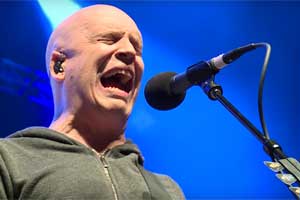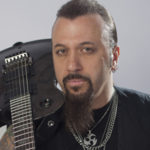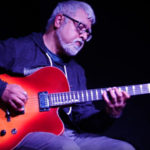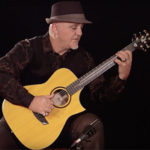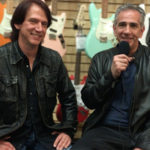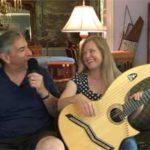Canadian guitar hero talks new album, new attitude and what lies ahead
By Gary Graff
September 9, 2016
Devin Townsend is a walking, playing definition of a musical auteur.
The guitarist, singer, songwriter and bandleader from British Columbia emerged during the mid-90s, recording and touring with Steve Vai before adopting the moniker Strapping Young Lad — which eventually became a band — for five albums of pulverizing metal. Townsend began venturing into other areas concurrently, releasing his first solo album (Punky Brüster — Cooked On Phonics) in 1996 and subsequently launching the Devin Townsend Band and the subsequent Devin Townsend Project, the latter of which has been going since 2008 and gradually become more of a band concern over the course of its seven albums, the latest of which, Transcendence, comes out today (September 9).
With two dozen albums so far, Townsend has established himself as shiftless and ambitious, constantly searching for new sonic adventures and creative situations, expanding his playing but never in a gratuitously flashy manner. So it shouldn’t come as a surprise that his next project will be a full-blown symphony.
FGPO: It’s been 20 years since your first solo album, Punky Brüster. Does it feel like 20 years? Twenty minutes? Two hundred years?
Townsend: [laughs] All three of those things. It feels like 220 years and 20 minutes. You know what it’s like; you get older, man. You look back. I look back 10 years ago, poking through some stuff and think, “10 years ago, man. Holy shit. Things have changed so much.” But it really doesn’t seem like it. It seems like truly yesterday — but it wasn’t. Hindsight is always 20/20, and you participate in the memories in different ways.
FGPO: Your primary vehicle now is the Devin Townsend Project, which you treat as a band. Are you trying to be less guitar god and more ensemble leader now?
Townsend: Yeah, in a sense. I think that to a certain degree it’s a matter of just time. Things change, man, and I think that, inevitably, things have to change; if you don’t you’re just going to end up repeating yourself. My goals as a person are very much in line with what I write about. I want to be a better version of myself, ultimately. Being a musician is a brilliant vocation, and I’m honored and humbled to be able to do it for a living. But also I don’t want to be a version of myself when I’m older that’s less developed than when I was younger. That wouldn’t make any sense. So part of that evolution includes being more of an ensemble-type character, I would think so.
FGPO: What has keep you interested in the Project?
Townsend: Like anything else, it depends on which project and what frame of mind I’m in. Often they just start, and then they end up somewhere — in a perfect scenario they end up somewhere. But I think there’s legs to this Project. It’s something I didn’t expect to continue, but it’s healthy and it’s a good band and there’s a lot of opportunities and it has a sound that has gotten some attention, right? So now I start going — this sounds crass but I don’t mean it to — How can I care again?”
FGPO: Is there a Project sound, or a Devin Townsend sound, that’s at least the starting point for things?
Townsend: Well, there’s a heavy, rhythmic midtempo thing influenced by Metallica or whatever. On top of that is this orchestral, Def Leppardy/Enya thing. Modern production. A lot of echo. Multi-tracked vocals. I’ve defined in my mind that that’s what the Devin Townsend Project does. It’s put to me to put out versions of that. But then you go on tour for two years and you have to play music. You don’t have any real emotional investment in anymore; It’s like: “Wow, this pays the bills if we keep producing this sound.” So my first thing now with the Devin Townsend Project is: “What can you mien out of this that you’re not going to be emotionally invested in, but you’re invested in enough that you’ll be able to invested the amount of passion into it that is required.” If I don’t care about it, if I’m phoning it in, that’s the reaction people are going to have to it. Ultimately with music, I have to react to it in order for me to want to participate in it.
FGPO: How does that then manifest itself into making the music as an ensemble?
Townsend: I’m very fortunate to have a group of guys that are very sensitive to my needs as an artist, very adept at being able to fill in the blanks in ways that sound like this band, which is great. Ultimately what I bring to the table as my most significant contribution is the vision. That’s the thing that I can only do on my own, right? And it’s not something you can conjure up; it’s akin to archaeology, you kind of see something stick out of the dirt and try to excavate it until you can see what it is.
FGPO: So what was that first piece of “discovery” for Transcendence?
Townsend: I think it started with the album cover, really. The guy who did the [album design] sent me a painting, and I said, “Fuck, that’s really cool. That looks like something I can get behind.” There was a lot of religion and religious symbolism in play; it applied to me that none of it is much more or less than the other. It’s a metaphor, in that sense. It’s amazing how much easier it is to gain control over the [musical] direction when it’s got some sort of visual counterpart. So it started with this picture, and there were already hints of that kind of archaeological dig sticking out of the psyche there. Once I had it tethered to some sort of image I was able to start refining the [music] I was working on and go from there.
FGPO: What was your guitar approach for this album? Did you incorporate any interesting new instruments or gear?
Townsend: I think the one thing that was interesting for me is that I’ve been doing this band, with this group of guys, for seven or eight years, maybe longer. And the whole first seven or eight years of it has been me fucking around with gear. Like, all of a sudden we’re on in-ears, a lot of triggers, everything direct. I got a signature set of pickups I was working on, changed guitar companies, tried a bunch of different things. So it seemed like for the whole beginning of this I was trying gear and trying things. And what that resulted in was never really focusing on the playing. I was always like: “What the fuck’s wrong with this? How come I don’t have this routed properly” and stuff like that.
FGPO: So you worked everything out by the time you got to this album?
Townsend: Yeah — for now. [laughs] This album was me just being: “I know what it is I want to do. These are the pieces of gear I can rely on to do it. This is the guitar. These are the pickups. I don’t need to fuck around with different pedals and different pre-amps. I know what I want to do.” So once I had my trip together, all I did was focus on playing — which in the tenure of this band has not existed until now.
FGPO: So what are you locked into using these days?
Townsend: I have my signature couple of guitars with Framus, who are with Warwick, but, dude, I got to design the body of both guitar,s every aspect of it. These are great fucking guitars for me, perfect for me, no “I wish it was this. I wish it was that.” This is perfect. Because I’m a cheeseball I call the main one Stormbender; the second one I’m trying to find a name for. Then I went to Boston and worked with Larry Fishman and did a signature set of Fishman pickups that give me three different sounds — a clean sound, a metal sound and a rock sound — in one pickup. Again, they’re perfect for me.
FGPO: How did you work within the band this time out?
Townsend: Well, to be fair, the writing process was not too dissimilar to things that I’ve done in the past — it was the assembly of it that was much different. In the past, what I would do is send the band 12 songs; it’d be like: “OK, here’s a part. Learn these parts and then we’ll record it.” When we started this band that’s what it was supposed to be; it’s not like I was trying to strong-arm the guys into doing things they didn’t want to do, but it was more like my solo stuff, and I wanted it done a certain way. But after 10 years, man, it’s like anything; you become friends and you have spats and ups and downs and grow and learn from all of it and grow and evolve from there.
FGPO: And that made you a kinder, gentler bandleader, right?
Townsend: [laughs] Well, one of the things I realized is that as a solo artist — not just me but in general — it’s very easy to get to a point where you lose the ability to self-edit. You get people with you that can do whatever you want and eventually you climb up your own ass to a certain extent. Having people around you that know you and have allowed you and afforded you to do certain things are also the best possible people to nudge you in a direction you may have fallen off from. So this time I presented a ton of songs to the guys and we went through them one at a time and it really became a collaborative situation as opposed to: “Play it like this. This is how the song goes.” Instead it was more like: “What should we do with it?” Ryan [Van Poederooyen, drummer] might say: “That fill there, why don’t I do something like this.” Dave [Young, guitar and keyboards] would be: “Now that Ryan is doing that fill, I’ll do this little passage here that’s a little different,” and Beav [bassist Brian Waddell] will be like: “You have the bass pounding eighth notes all the way through, what if we do this instead?” The end result is we really put a lot of care into crafting the songs in a way that as completely collaborative even though the gestation was: “Here’s a bunch of songs” from me. It was more satisfying for everybody, I think.
FGPO: What else are you working on these days?
Townsend: I’m doing a symphony next, which is a massive undertaking. I’m currently in the sort of formative stages, which includes a lot of prep and delegating. I’m trying to make it so that I foresee the effort that’s going to go into it and have all those kind of eventualities covered, so when I actually started creating it I’ll be composing and in the creative flow rather than trying to get the gear sorted out or get logistics together and all of that. I’ve got a skeleton worked out right now, so it’s down to just what it’s going to sound like and getting the logistics of it together. So the plan is I’ll start piecing together demos in November. And I’ve got a ton of other records that, if time presents itself, I’ll do. But one thing I’ve learned recently is I’ve got to streamline what it is I’m thinking about because it’s too easy to get sidetracked.
